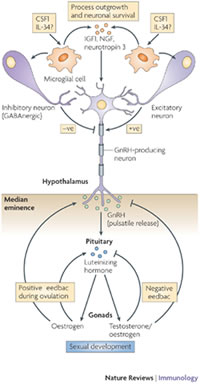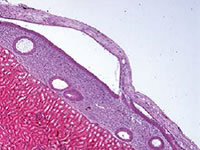 The National Institute of Child Health and Development(NICHD) Specialized Cooperative Center Program in Reproduction and Infertility Research (SCCPIR) at Einstein is focused on a wide range of diseases of the female reproductive system including the impact of obesity on reproductive function, menstrual disorders, endometriosis and infertility.
The National Institute of Child Health and Development(NICHD) Specialized Cooperative Center Program in Reproduction and Infertility Research (SCCPIR) at Einstein is focused on a wide range of diseases of the female reproductive system including the impact of obesity on reproductive function, menstrual disorders, endometriosis and infertility.
Dr. Jeffrey W. Pollard is the Director of the Center. He is the Louis Goldstein Swan Chair in Women's Cancer Research, Director of the Center for the Study of Reproductive Biology and Women's Health and Deputy Director of the Cancer Center at Einstein, Professor of Developmental and Molecular Biology and of Obstetrics & Gynecology and Women’s Health.
 The SCCPIR is part of a larger “Center for the Study of Reproductive Biology” also directed by Dr. Pollard and this Center has research on most areas of female reproductive biology. It has seven faculty affiliated with us covering five departments at Einstein as well as a profound partnership between Einstein and Montefiore Medical Center especially through the Department of Obstetrics & Gynecology and Women’s Health. Through these links the Center has a particular concern with reproductive health in the Bronx and this center obesity, diabetes, and metabolic syndrome are especially common here in the local community. Each of these conditions is strongly associated with reproductive tract diseases notably infertility, endometriosis, and endometrial cancer. For example, endometriosis, the abnormal growth of endometrial tissue outside the uterus, is one of the most common gynecological diseases, affecting more than 5.5 million women in North America. According to the NICHD, an estimated 2 to 10 percent of women of reproductive age have endometriosis. The two most common symptoms of the disease are pain and infertility. About 30 percent to 40 percent of women with endometriosis are infertile. In addition in 2008, 40,100 women in the U.S.were diagnosed with endometrial cancer another disease of abnormal cell growth in the endometrium and 7,470 died of the disease.
The SCCPIR is part of a larger “Center for the Study of Reproductive Biology” also directed by Dr. Pollard and this Center has research on most areas of female reproductive biology. It has seven faculty affiliated with us covering five departments at Einstein as well as a profound partnership between Einstein and Montefiore Medical Center especially through the Department of Obstetrics & Gynecology and Women’s Health. Through these links the Center has a particular concern with reproductive health in the Bronx and this center obesity, diabetes, and metabolic syndrome are especially common here in the local community. Each of these conditions is strongly associated with reproductive tract diseases notably infertility, endometriosis, and endometrial cancer. For example, endometriosis, the abnormal growth of endometrial tissue outside the uterus, is one of the most common gynecological diseases, affecting more than 5.5 million women in North America. According to the NICHD, an estimated 2 to 10 percent of women of reproductive age have endometriosis. The two most common symptoms of the disease are pain and infertility. About 30 percent to 40 percent of women with endometriosis are infertile. In addition in 2008, 40,100 women in the U.S.were diagnosed with endometrial cancer another disease of abnormal cell growth in the endometrium and 7,470 died of the disease.
Indeed research in reproductive biology has profoundly and positively impacted women’s health in the last few decades as well as having wide-ranging social consequences. More recently, the advent of new technologies has enabled great strides in the understanding the basic biology of fertility and reproduction in animal models. Einstein’s SCCPIR will concentrate on basic studies of endometrial biology and reproductive neuroendocrinology and has as its central aim the use of mouse and rat models to determine the mechanistic basis of reproductive function and then through a training and research program for clinical fellows, translate these findings into human biology and thereby into benefits to human health.
Einstein’s SCCPIR research projects and principal investigators include:
- Drs. Jeffrey W. Pollard and Nanette Santoro. "Estrogen and Progesterone Regulation of Human Endometrial Cell Proliferation"
- “Reproductive Hormonal Alterations in Obesity” — Dr. Santoro, Maureen Charron, Ph.D., Professor of Biochemistry, of Obstetrics & Gynecology and Women's Health, and of Medicine; and Alex Polotsky, M.D., Assistant Professor of Obstetrics & Gynecology and Women's Health.
- “IGF-I and Neuroendocrine Regulation of Female Reproductive Function” — Anne Etgen, Ph.D., Professor of Neuroscience, of Psychiatry and Behavioral Sciences, and of Pediatrics; and Genevieve Neal-Perry, M.D., Ph.D., Assistant Professor of Obstetrics & Gynecology and Women's Health and of Neuroscience.
- “Antagonistic Actions of Melanocortins and Leptin on Reproductive Competence” — Streamson Chua, M.D.,Ph.D., Professor of Medicine and of Neuroscience.